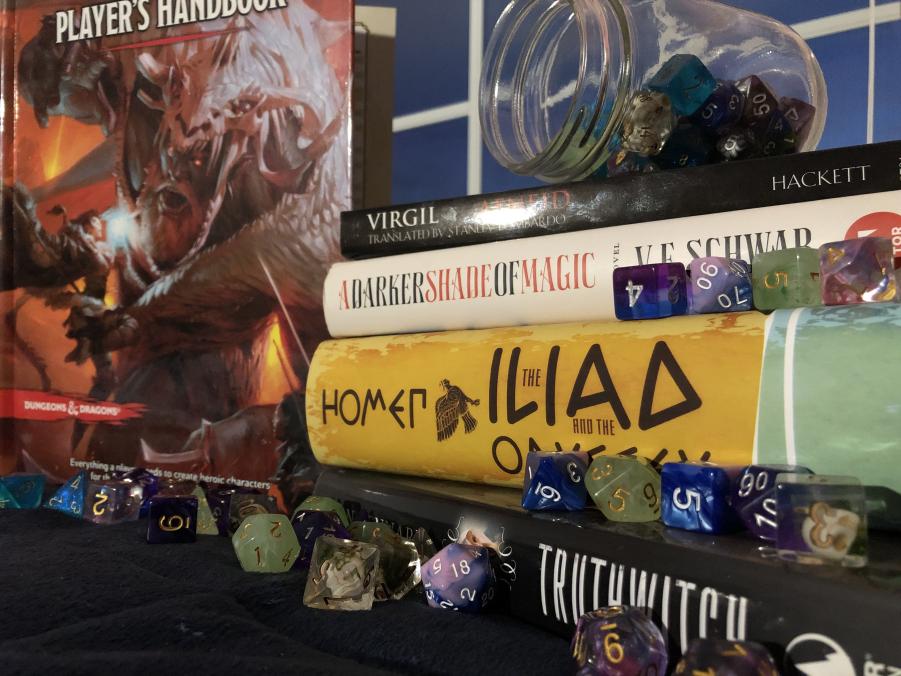Written by: Eileen Sholomicky
Reading has always been the great love of my life. I have a photograph of myself around two, possibly three years old, sitting in my father’s enormous recliner with the Connecticut Post in my hands, trying to make sense of the words in front of me. Books have always been my most faithful companions, but lately, a new love has entered my life: Dungeons & Dragons.
A tabletop roleplaying game (TTRPG) first introduced in 1974, D&D has seen a resurgence in popularity in the last few years thanks to actual-play shows like Critical Role, The Adventure Zone, and Dimension 20. Playing this game has given me a new perspective on storytelling and allowed me to make wonderful friends.
Today, I am here to combine my two great loves and kick off a three-part series: recommending books based on D&D‘s class system. In this first installment, I will focus on the four martial classes: barbarians, fighters, monks, and rogues.
Barbarians
Barbarians are one of the strongest playable classes in the game, and they are most famous for their Rage feature, in which they enter a furious, berserker-like state in combat. For this reason, those who favor the barbarian class may enjoy one of the greatest classics of our age, Homer’s Iliad. The narrative focuses on Greece’s most ferocious warrior, godlike Achilles, his temper and butting heads with Greek general Agamemnon, and his uncontrollable rage. The first word in the original Greek text is even μῆνιν: wrath. I have personally only read the Stanley Lombardo poetry-style translation through my studies of the Iliad at UConn, but I’m excited to pick up Samuel Butler’s prose edition.

Fighters
Fighters, while they do not enter a rage like Barbarians, are no less fearsome as warriors. They are masters of martial combat and can push themselves beyond their limits with their Action Surge ability. The best book for those who prefer to play as a Fighter is Virgil’s Aeneid, a follow-up of sorts to the Iliad focused on Aeneas, originally a minor character whose descendants are destined to found Rome. Throughout the narrative, he suffers many losses, including those of his family and of his wives, forced onward without a grieving period by the gods and the looming threat of battle. He squares off against several foes, including fearsome Turnus, with a battle rage that could rival Achilles. And yet, Aeneas presses on anyway, which makes the Aeneid the perfect read for fans of the Fighter class.

Monks
Monks are trained in combat to perfection. While engaged in battle, their Unarmored Defense ability allows them to have all of the benefits of wearing armor—without actually doing so. This reminds me of Aeduan, a supporting character in Susan Dennard’s Truthwitch. He is a monk with the powers to control a person’s blood, which is perfect for the Monk class, as they can manipulate ki, known in D&D as the element that flows through the bodies of the living. Aeduan’s job is to hunt down the titular Truthwitch, Safiya, for her dangerous power to discern truth from lies, and ends up tangled in the political machinations and moral dilemmas plaguing the Witchlands. He makes for a compelling character—and perhaps inspiration for an interesting D&D character!

Rogues
Finally, Rogues are masters of stealth. Assassins, thieves, and arcane tricksters, they prefer to stay at the very edges of a battle, lurking in the shadows and striking when the time is right. In these moments, they can use their Sneak Attack abilities to deal bonus damage to their foes. One character who embodies the life of a rogue is Delilah Bard, a quick-witted thief and one of the main protagonists of V.E. Schwab’s Shades of Magic trilogy, which begins with A Darker Shade of Magic. ADSOM begins with our other protagonist, Kell Maresh, who wears a peculiar coat and is able to travel between four Londons—three with magic and one without. Things get complicated when Delilah, hailing from Gray London (or magicless London), insists she come on his adventures, and won’t take no for an answer.

Though I’ve a much bigger preference for spellcasters than melee fighters, the Rogue class will always have a piece of my heart. My first player character ever was a rogue, and that campaign allowed me to make some wonderful friends and meet new people at UConn! These books are also some of my favorite books of all time, and I’m especially partial to the Aeneid. I hope that this list allows you to meet a new favorite book, and perhaps a new favorite character class!
When we return, we’ll be taking a look at the martial-spellcaster classes: Artificers, Paladins, Rangers, and Warlocks. Until next time, and happy reading!


You must be logged in to post a comment.